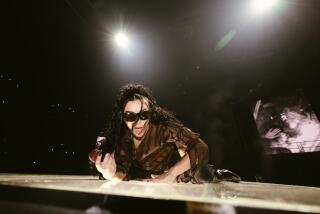Charro’s Pep Fills Gaps by Headliner Roger Williams
- Share via
Call it an odd-couple pairing at the Cerritos Center for the Performing Arts on Friday night. The bubbly, bawdy, effervescently humorous singing and guitar playing of Charro, followed by the mannered, carefully controlled piano playing of Roger Williams.
And, although Williams was nominally the headliner, it was a good thing Charro was around to perk up the opening segment, since Williams’ peculiarly uneven set often verged close to a kind of bathos that had little to do with the pianistic hits that the overflow crowd had come to hear. Even more peculiarly, he made no reference to the tunes on his 113th album, “Softly as I Leave You,” a tribute to Frank Sinatra.
Instead, he devoted a substantial portion of his set to a pair of lengthy, poetically styled readings--the first relating to love and loss, the second to a Will Rogers aphorism. Williams’ elegant stage manner made for an effective delivery of the material, but it was never quite clear what it had to do with the music. And the time devoted to the verbal presentations meant that such Williams classics as his renderings of “Born Free,” “The Impossible Dream”--as well as the Sinatra songs--never made their way into the program.
The tunes Williams did play were delivered with the carefully arranged structures that have always characterized his work. At one point, he even dipped into jazz, referring to a little-known facet of his interests, dating from a period in the ‘40s and ‘50s when he roamed through the New York bebop scene. Choosing a bebop tune--”Groovin’ High”--based on the chords of a popular song (“Whispering”), he combined the two, tossing in a reference to “The Woody Woodpecker Song,” as well.
*
Though it wound up having little to do with jazz, it was a fascinating example of Williams’ ability to take virtually any piece of music and transform it into his own utterly unique vision. Too bad he didn’t elect to do it more often in a program that would have benefited from a lot less talk and a lot more music.
Charro’s set, on the other hand, was perfectly balanced. Making jokes at her own expense about her accent, her age and her looks; telling humorous stories--including an uproarious description of how the lisp became a part of Castilian Spanish--she was constantly entertaining. At one point, she strolled through the auditorium with a microphone, doing the “cuchi-cuchi,” pulling the highly receptive listeners into her whimsical orbit.
She wound up her portion of the program with an adept group of guitar selections--performing with articulate skill--asking, “Did you like eet?” after each number. The answer from the crowd, in each case, was a resounding “Yes!”
In a way, her unexpected musical skills served as a kind of ironic counter to Williams: His failure to deliver as many tunes as the audience expected balanced by Charro’s unanticipated musical generosity.
More to Read
The biggest entertainment stories
Get our big stories about Hollywood, film, television, music, arts, culture and more right in your inbox as soon as they publish.
You may occasionally receive promotional content from the Los Angeles Times.










